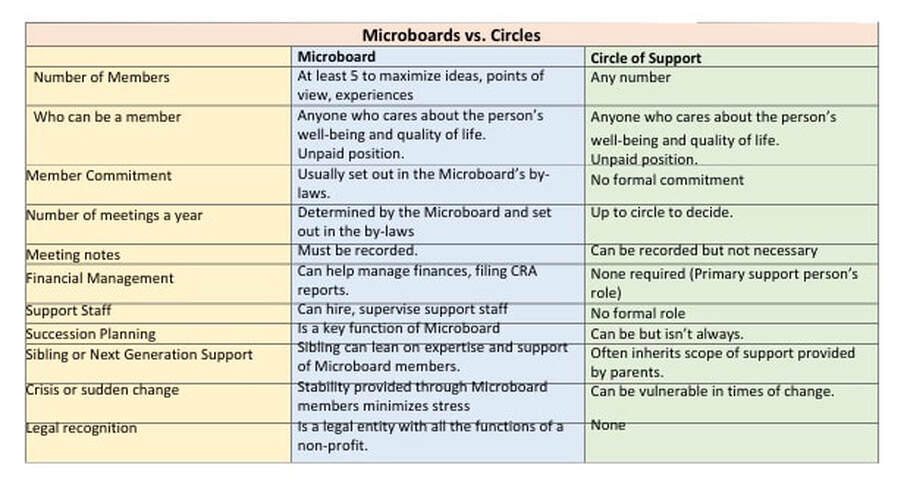Circles of Support
We know that happiness and well-being are closely connected to the relationships in our lives. We seek out our family and friends when we need someone to talk to, someone to share time with and when we are looking for support and encouragement. Often the reason people with disabilities can live and participate in a rich way in their neighbourhood and community is because of the connections and friendships they have with other people. Sometimes this group of family and friends is interchangeably referred to as a Circle, Circle of Support, Circle of Friends or a Support Network.
Some people already have a network of trusted friends, family and others. Other people may need help to start, to expand their Circle or to strengthen the relationships they already have. In this situation, it may be helpful to find someone who can assist with this process. There may be people or a person in your life who you could consider for this role or you may want to consider working with an Independent Facilitator.
Circles can be an important source of support and friendship through the person’s life. Some people, after having a Circle or Support Network for a period of time, choose to formalize this arrangement and create a Microboard.
Some people already have a network of trusted friends, family and others. Other people may need help to start, to expand their Circle or to strengthen the relationships they already have. In this situation, it may be helpful to find someone who can assist with this process. There may be people or a person in your life who you could consider for this role or you may want to consider working with an Independent Facilitator.
Circles can be an important source of support and friendship through the person’s life. Some people, after having a Circle or Support Network for a period of time, choose to formalize this arrangement and create a Microboard.
Independent Facilitation
Many people with a disability and their families are looking for support to make decisions and create the changes that they want and need to see in their lives. They want to plan and create action that makes it possible for them to live as valued citizens of their community where they have control over their lives and the support that they require. Independent facilitation is a planning process that helps them create these changes. This process is led by an Independent Facilitator, a neutral person whose role is to help the person create a vision for their future, make decisions about the possibilities in their life and outline the steps to get there. It is designed to be free of any potential conflict of interest between the way supports may have been delivered in the past, and the vision that a person and their family have for their future. It was developed to ensure that people and their families remained in control of the course of their lives and the way they receive support. In this process, the decision making always rests in the hands of the person. The facilitation process may or may not involve a personal support network or circle of support, depending on the person’s wishes.
In helping to create a vision for the future, an Independent Facilitator can facilitate many objectives including exploring passions and interests, finding paid or volunteer work, developing new roles in community, nurturing new friendships and exploring options for a home life. While an Independent Facilitator mainly develops a supportive one-on-one relationship with the person, at times a Facilitator may also 'support the supporters'. Connecting with support workers and other friends or people involved in supporting a person helps to ensure that everyone is focused on the same objectives.
The Ontario Independent Facilitation Network provides ongoing support to independent facilitation and planning by strengthening self advocacy and autonomous family voices, offering mentoring, and education for independent facilitators in their local practice, through regional networks, and through the provincial community of practice. They note that facilitation is based on walking with people and their families and is grounded in the following important values:
- Listening - Deep listening, with a genuine intent and desire to understand who this person is, and what they truly desire and need, is at the core of the work. Communicating with the person in ways that lets them know that they have been heard and understood.
- Building Trust - Developing a relationship with the person that lets the person know and experience that we are “on their side”. It involves deep listening and communication, but it also involves actions that align with what the person has expressed as important. It involves follow through, doing what we say we will do.
- Prioritizing - Since there are so many issues that people need and want to change, the work of facilitation involves helping people to make decisions about what is important to do first, given the vision they have expressed, the needs that are most urgent, and the resources of people, money, and time that are available.
- Planning - The work involves planning for action, making decisions about what we will do; who will do it; and when it will be done.
- Action - The work involves making sure that people follow through on plans that have been made. It involves Facilitators following through on what they have said they will do, but it also involves finding out what other people will need to be able to follow through.
- Reflection and learning - Facilitators support the learning that can come from experience, making each plan and action build on the capacity of people to be stronger, more powerful, and more capable of directing their lives. Facilitators guide a process of reflection for the person and their trusted circle of support, with the intention of learning that can guide future plans and action.












